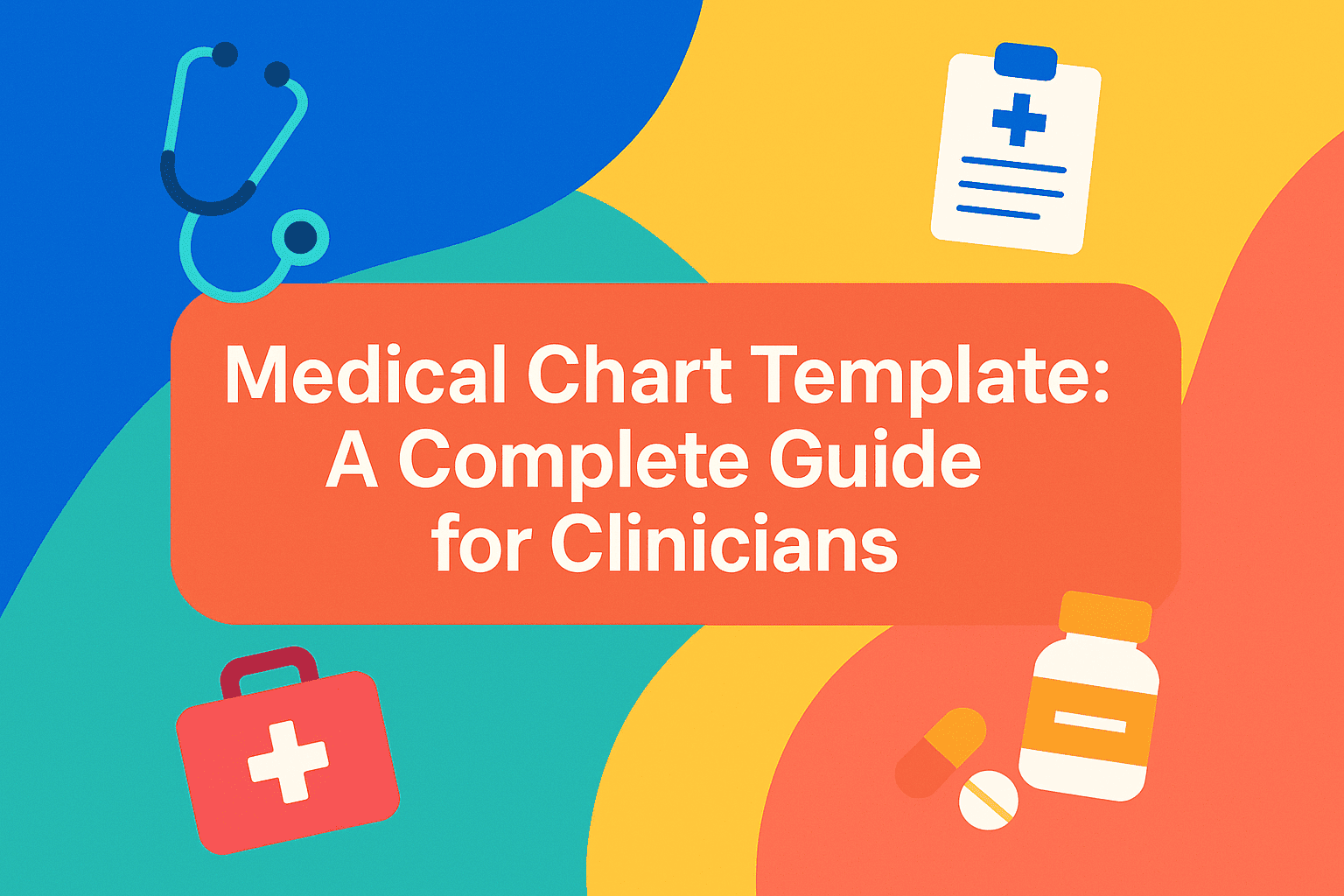Updated on: July 12, 2025
DocScrib Complete Medical Chart Template for Clinicians (With Examples)
Complete Medical Chart Template for Clinicians (With Examples)
A standardized medical chart template is essential for effective clinical documentation. It streamlines data capture, enhances accuracy, supports compliance, and saves time—especially when paired with intelligent tools like DocScrib’s AI Medical Scribe.
📋 How Do Medical Charts, Medical Records, and Medical Reports Differ?
While these terms often get used interchangeably in healthcare, there are key distinctions:
- Medical Chart: Think of this as the clinician’s working file—a real-time, structured documentation space for a patient’s encounter details. It tracks information like vital signs, clinical notes, medications, and treatment orders as care unfolds.
- Medical Record: This is the comprehensive archive. It compiles everything: past medical charts, lab results, imaging, hospitalizations, referrals—essentially the full history of a patient’s care across providers and over time.
- Medical Report: A report is more of a summary document. It distills findings, observations, diagnoses, or outcomes related to a specific visit or episode of care—such as a discharge summary, a radiology report, or an operative note.
In short, the chart organizes current data, the record serves as the complete historical library, and the report summarizes particular episodes or findings. Each plays a distinct, vital role in patient care and documentation.
🔐 Compliance and Patient Privacy: Safeguarding Medical Chart Data
Managing medical chart data isn’t just about accuracy and thoroughness—it’s also about protecting sensitive patient information. To ensure records are secure and privacy is respected, healthcare organizations and clinicians should adhere to well-established industry regulations:
- HIPAA (Health Insurance Portability and Accountability Act): Sets the standard for protecting sensitive patient health information in the United States.
- GDPR (General Data Protection Regulation): Governs data privacy for individuals within the European Union.
- APPs (Australian Privacy Principles): Provide guidelines for handling health information in Australia.
- ISO 27001: An internationally recognized framework for information security management.
- SOC 2: Focuses on security and privacy controls relevant to technology and cloud-based services.
By following these frameworks, medical chart data is kept confidential, secure, and compliant—no matter where care is delivered. This commitment to privacy not only reduces legal risk but also builds trust with patients and care teams alike.
🏋️ Core Sections of a Medical Chart Template
Here’s a breakdown of the essential components every comprehensive chart should include:
| Section | Purpose / Common Data |
|---|---|
| Patient Demographics | Name, DOB, gender, ID, admission/discharge dates, room/ward, responsible physician, emergency contacts |
| Admission Details | Reason for admission, admitting diagnoses, allergies, advanced directives |
| Vital Signs | Date/time, BP, HR, RR, Temp, SpO₂, pain score |
| Medical & Surgical History | Prior diagnoses, surgeries, family history |
| Current Medications | Medication name, dosage, frequency, prescribing provider |
| Allergies & Reactions | Known drug, food, environmental allergies |
| Labs & Diagnostics | Date, test name, result, interpretation |
| Progress Notes | Subjective, objective, assessment, plan (SOAP), observation notes |
| Treatment Plan | Prescribed meds, therapies, dietary instructions, activity levels |
| Nursing Notes | Date/time, observations, interventions by nurses |
| Discharge Summary | Discharge date, final diagnosis, completed procedures, discharge medications, follow-ups, patient education |
| Signatures | Clinician and nurse sign-off |
Optional but valuable sections include consult notes, second opinions, operative reports, and follow-up tracking.
📝 Example Chart Template (Sample Flow)
Patient Demographics:
- Name: John Doe
- DOB: 01/15/1970 | MRN: 123456 | Admission Date: 06/28/2025
- Attending: Dr. A | Nurse: B | Emergency Contact: Jane Doe (spouse)
Chief Concern & Admission:
- Reason: Chest pain x 2 hrs
- Allergies: None; Advanced directive: DNR
Vitals (06/28 @ 09:15):
- BP 150/90 mmHg | HR 85 bpm | RR 18 | Temp 98.6°F | SpO₂ 97% | Pain 6/10
Hx & Medications:
- PMH: HTN, high cholesterol; Surgeries: cholecystectomy 2010
- Meds: Lisinopril 10 mg daily; Atorvastatin 20 mg nightly
Labs:
- CBC: WNL; Troponin: pending; Electrolytes: WNL
Progress Note (SOAP):
- S: “Chest discomfort, pressure-like, mid-sternum”… denies SOB or nausea.
- O: EKG—NSR, no ST changes; Mild epigastric tenderness
- A: Chest pain, rule out ACS pending troponin/EKG
- P: Cardiology consult, continuous telemetry, repeat trop in 6 hrs
Treatment:
- Aspirin 325 mg PO, NPO until further orders
- Telemetry and oxygen 2 L NC PRN
Nursing Notes:
- 09:45: Administered aspirin, patient resting, no further pain
Discharge Plan (TBD pending ruling out ACS)
Signatures:
- Dr. A (06/28/2025)
- Nurse B (06/28/2025)
🎮 How AI Makes Charting Better
Here’s a video walkthrough showcasing charting templates in action with an AI scribe:
Charting Templates Tutorial – CharmHealth EHR
🔧 Efficiency Strategies
- Use Structured Templates: Familiar formats guide faster, more accurate entries.
- Be Concise: Bullet points and abbreviations streamline input.
- Involve Support Staff: Nurses and assistants can fill sections like vitals or meds.
- Leverage AI Scribing: Voice-driven input captures entire encounters in real-time.
✅ Benefits Recap
- Captures complete patient data consistently
- Speeds up documentation, especially for repeat visits
- Simplifies billing compliance and supports coordination
- Allows clinicians to focus on patients, not paperwork
🚀 Get Started with DocScrib
Sign up today to access:
- Customizable, secure chart templates
- Real-time AI-driven documentation
- Format-free data export for EHR systems
Download your complimentary Medical Chart Template today and start charting smarter with DocScrib!
